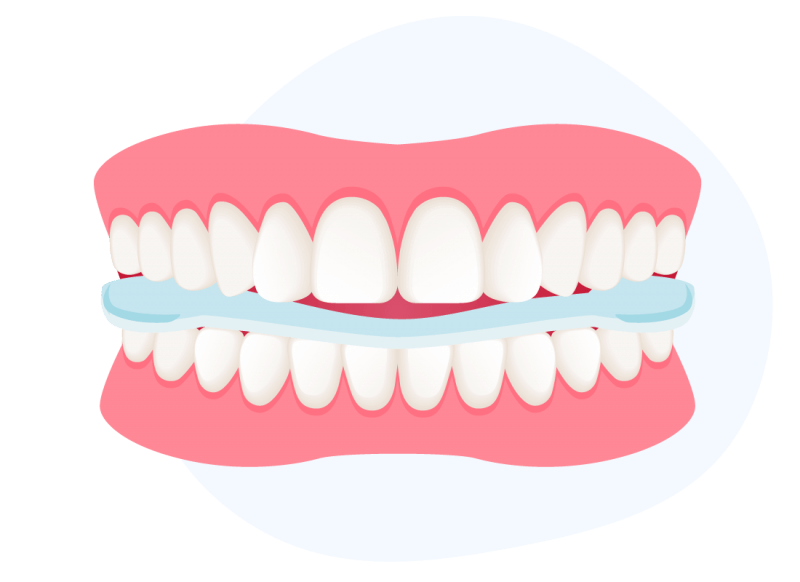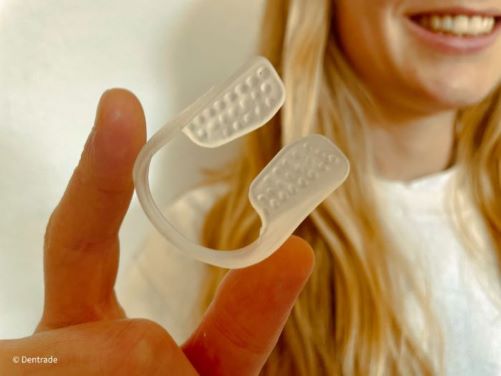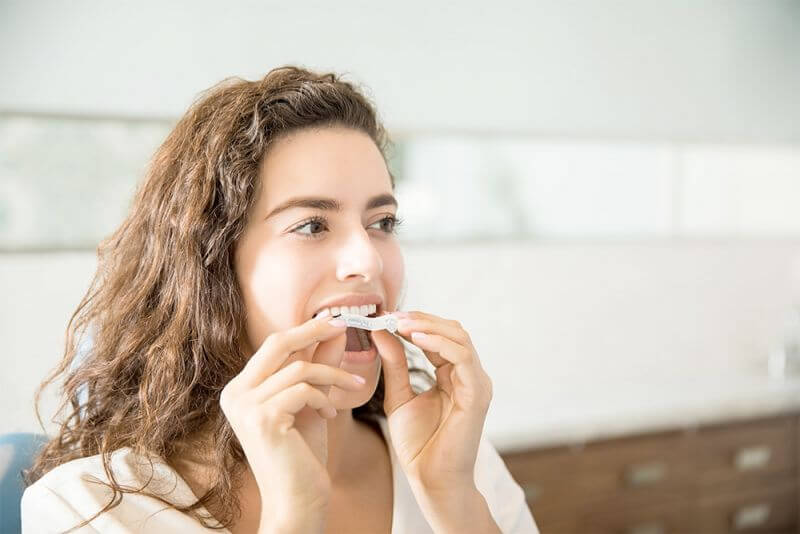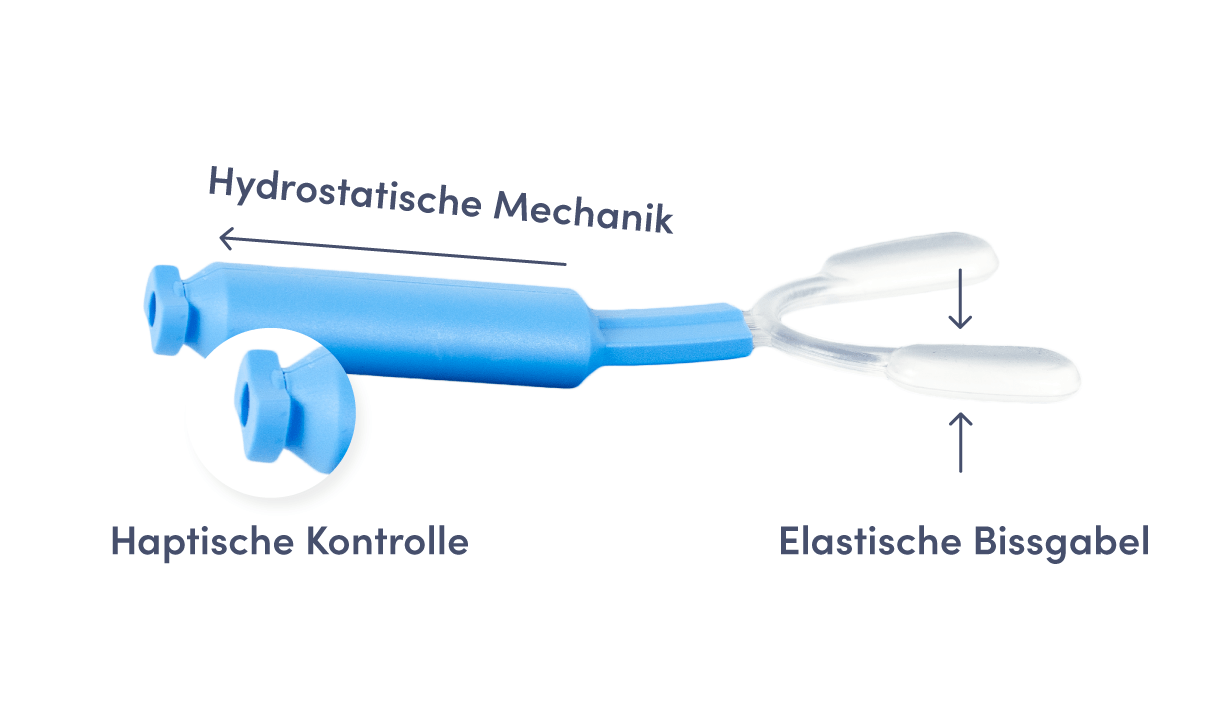TMD is a malfunction of the jaw joints which can affect the head, neck and back. The causes and symptoms are often unspecific, but they are a great burden for those affected. Our products RehaSplint, Aqualizer, RehaBite and Spoony offer quick relief for TMD complaints.
What is TMD?
Temporomandibular joint dysfunction in a nutshell
TMD or temporomandibular joint dysfunction is a very complex disease of the jaw muscles. Both physical and mental issues may cause or indicate TMD. The neuromuscular system in the head is extremely sensitive to environmental influences, stress, hectic or anger. Tension in the jaw muscles, but also malocclusions in the dentition, can extend to the neck or back. In turn, muscle tension in the head, neck and jaw muscles trigger tension headaches.
Important:
TMD is often confused or used synonymously with TMJ. TMJ stands for temporomandibular joint. This small joint is located right next to the ears and connects the jaw to the skull, hence allowing us to use our mouth for speaking, chewing and other movements. TMD (also known as TMD syndrome or TMJ dysfunction) refers to the disorder of the joint.
What are the causes of TMJ dysfunction?
The causes of TMD are often unspecific. Researchers and doctors assume it is the interaction of various triggers influencing each other, such as physical, psychological and social circumstances.
The following symptoms are generally considered to be related to TMD. Through ongoing research, the list is being updated frequently by physicians and researchers:

- Tooth damage
- Teeth grinding
- Incorrect fillings or crowns
- Misalignment of teeth or jaws
- Jaw damage due to genetics or accidents
- Skull growth
- Hormones
- Genetic conditions
- Emotional stress
- Psychological problems
- Pre-existing diseases (e.g. rheumatism, arthrosis, arthritis)
- Traumas in the jaw and skull
- Postural disorders
- Loss of vertical jaw relation
- Sleeping disorders
- Orthodontic treatments
TMD: Symptoms
Symptoms of TMD are very complex. Patients may experience physical as well as psychological discomfort. Due to imprecise symptomatology, diagnosing TMD is multifactorial and difficult to diagnose. The jaw muscles, neck and head belong to the main TMJ pain areas, but tension in the temporomandibular joint often extends to many body parts. Typical symptoms of TMD include but are not limited to:
- Jaw clicking or popping
- Sore or stiff jaw muscles
- Jaw joint pain
- Difficulty in chewing and swallowing
- Disturbing sensation of individual teeth
- Clenching/grinding of the teeth (bruxism)
- Abrasion/loss of tooth substance
- Tension headache (migraine)
- Pain/tension in neck, throat, shoulders and back
- Tinnitus
- Dizziness, balance disorders
- Jaw arthrosis
- Hypersensitivity to light
If three or more symptoms apply, it could be a sign of TMJ disease.

Do I have TMD syndrome?
If you experience severe TMJ pain or other symptoms that can be relieved with RehaSplint or Aqualizer, it is likely that you suffer from TMD. In order to identify TMD syndrome, a dentist or TMD specialist will make a differential diagnosis based on a functional analysis.
The aim of the examination is to determine whether there is an incorrect bite affecting joints or muscles of the jaw.
If not treated, teeth grinding or clenching, also known as bruxism, is the most common cause of TMD syndrome. According to current scientific knowledge, bruxism cannot be cured.
New fillings, crowns or braces are often found to be disturbing. Unconsciously, the adaptation of the masticatory system and the altered occlusion lead to muscular postures that cause permanent discomfort. This may affect chewing patterns and the swallowing process. When swallowing, the teeth of the upper and lower jaw should touch evenly. This position is called maximum intercuspation or static occlusion.
As a treating physician, e.g. orthodontist or physiotherapist, you may receive exclusive offers from us.
Early detection of TMD saves you from unpleasant consequences. You suffer from possible symptoms and think you might have TMD? With our free online TMJ dysfunction test, you can get a first indication of your state of health.
Note: The test results do not replace a medical diagnosis! Please be sure to discuss the result and your symptoms with your doctor.

As a therapy and also to protect the hard tooth substance, the patient should receive an individually adjusted hard TMD splint. Muscular dysfunctions can also be treated with an Aqualizer, RehaBite and other physiotherapeutic measures. You can find all our offers for TMJ disorder treatment as well as accessories, such as our brace box, in our online store.
Please note: The Aqualizer is not a permanent splint and should not be used as one. It is not a replacement for proper dental treatment, or permanent splints.

NEW: Occlusal splint for TMD symptoms – the RehaSplint
Immediate help for TMD symptoms with the RehaSplint, our new bite splint. The temporary grinding splint prevents neuromuscular adaptations and thus improves your quality of life. It relieves adapted postures of the lower jaw and reduces pain in the case of muscular impairment due to overloading, tension due to postures of rest or changes in the position of the bite. The grinding splint is available in three different versions:
You can use the RehaSplint for various symptoms, complaints and clinical pictures, for example:
- Occlusal disorders
- Bruxism (teeth grinding or clenching)
- Muscular imbalances
- Tension due to relieving postures
- TMD complaints
Immediate relief for TMJ dysfunction symptoms: the Aqualizer
Our Aqualizer is a water-filled relaxation splint designed to relax the patient's chewing muscles. The water is used to equilibrate the jaw – this is known as the "hydrostatic principle". The Aqualizer offers immediate relief, especially for these symptoms:
- Teeth grinding
- Tension headaches
- Back pain
The Aqualizer can also be used as a temporary diagnostic splint. We offer three models with different water fillings for children and adults to fit all physical conditions:


TMD treatment exercises: the RehaBite
The RehaBite helps you to strengthen your jaw muscles from the comfort of your home and treat TMJ pain yourself. This elastic bite fork is filled with glycerine and enables force-controlled training. It distributes the chewing pressure in the jaw evenly and dissolves painful relieving postures.
The RehaBite can be used as an alternative or as a supplement to a bite splint, e.g. the Aqualizer. It may be used to treat the following conditions, among others:
- Stroke aftereffects
- Jaw opening restrictions
- Pronounced muscular imbalances
The RehaBite does not need to be adjusted individually. The device has five adjustable intensity levels, which allow you to use it according to your personal requirements.
TMD is short for temporomandibular joint dysfunction, a complex disorder of the jaw muscles. The causes as well as symptoms are manifold and often go beyond the jaw.
The causes for TMD may be of genetic, psychological or social origin as well as damage caused by accidents or other diseases.
The following symptoms are generally considered to be related to TMD:
- Tooth damage
- Teeth grinding
- Incorrect fillings or crowns
- Misalignment of teeth or jaws
- Hormones
- Genetic conditions
- Psychological problems
- Postural disorders
Disorders and misalignments in the jaw can radiate to the head, neck and back. Typical symptoms of CMD include:
- Jaw clicking or popping
- Sore or stiff jaw muscles
- Jaw joint pain
- Difficulty in chewing and swallowing
- Disturbing sensation of individual teeth
- Clenching/grinding of the teeth (bruxism)
- Tension headache (migraine)
The RehaSplint or Aqualizer, allows you to both diagnose and treat the syndrome. The relaxation splints distribute bite forces evenly, reduce TMJ pressure and ensure relief.
Please note: The splints are not a substitute for an individually made hard splint. They serve as a temporary relaxation splint and diagnostic device. For further treatment, please consult your treating physician.
You can also train your jaw muscles properly, for example with an elastic bite fork such as the RehaBite. With the training device, you can dissolve relieved postures.
